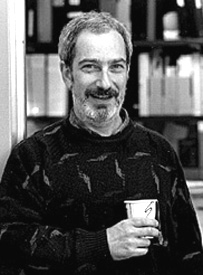Our Science – Raffeld Website
Mark Raffeld, M.D.
 |
|
|||||||||||||||||||||
Biography
Dr. Raffeld received his M.D. from the Abraham Lincoln School of Medicine of the University of Illinois. He completed clinical training in pathology at the Brigham and Women's Hospital in Boston and at the Hematopathology Section of the Laboratory of Pathology (LP), NCI. He was appointed to the laboratory's permanent staff in 1989. Dr. Raffeld serves as deputy chief of the Hematopathology Section and is also responsible for the Laboratory of Pathology's Specialized Diagnostics Unit, which includes the Clinical Immunohistochemistry Unit and the Molecular Diagnostics Unit. Dr. Raffeld's research interests are concerned with the molecular pathogenesis of lymphomas and the use of molecular and immunohistochemical markers in lymphoma diagnosis.
Research
Molecular Pathogenesis of Human Lymphomas
The Immunohistochemistry Unit provides immunohistochemical support for all diagnostic pathology services in the laboratory using state-of-the-art automated equipment and serves as a resource for intra- and inter-departmental collaborative research. The service maintains a stock of approximately 120 antibodies for diagnostic studies and performs over 25,000 clinical stains per year.
The Molecular Diagnostics Unit performs molecular genetic tests to support the clinical and research activities of the NIH. Tests involve DNA-PCR, RT-PCR, DGGE, Southern blotting, and in situ hybridization. Clonal analysis for immunoglobulin and TCR rearrangement accounts for over 80 percent of requested tests. Other tests include analyses of Bcl-1, Bcl-2, NPM/ALK fusion transcripts, HHV-8, EBV, and p53.
Lymphomas account for about 10 percent of human neoplasms. They have a wide range of behavior even within the same histologic subtype. The laboratory's research is directed toward elucidating and understanding the molecular mechanisms underlying the pathogenesis of lymphomas, and in using this information to develop rational methods for classification and prognostication.
ALCL, a large cell lymphoma variant that primarily affects children and young adults, is characterized by the t(2;5), which results in inappropriate expression of anaplastic lymphoma kinase (ALK) through its fusion with nucleophosmin (NPM). We have shown that NPM/ALK fusion transcripts are specific to ALCL, and do not occur in other lymphomas, including Hodgkin's disease (HD). We also showed that the immunohistochemical profile of ALCL is different from HD, in that ALCL expresses the cytotoxic granule-associated proteins TIA-1, perforin, and granzyme B. Because some cases of ALCL simulate HD, these molecular and immunohistochemical markers are useful in distinguishing the two diseases. These types of studies provide an objective basis for using molecular tests diagnostically.
We have also been interested in understanding the functional significance of recurrent coding region mutations that we identified in cases of Burkitt's lymphoma. We found that mutations surrounding a region including Thr 58 and Ser 62 interfered with phosphorylation at these sites and enhanced the transforming potency of MYC. More recently we have found a second grouping of mutations involving MYC box II that do not enhance transformation properties, but rather interfere with Myc's ability to mediate apoptosis. These studies are providing new information regarding the mechanism of action and control of this critical regulatory protein.
Our laboratory also participates in the NCI CGAP initiative through the provision of tissues for use in this gene discovery effort, and in developing immunohistochemical staining procedures for laser capture microscopy. The information generated from the CGAP effort should help in elucidating the genetic pathways involved in the genesis of different lymphomas and in lymphoma progression.
This page was last updated on 9/11/2008.

